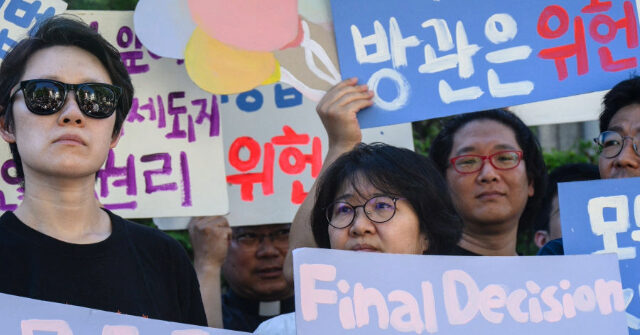The South Korean Constitutional Court ruled on Thursday that many of the government’s climate change goals are unconstitutional — not because they go too far but because they do not go far enough.
The case was called Woodpecker et. al. v South Korea. “Woodpecker” is the nickname of a human embryo whom the environmental groups that filed the suit in 2020 named as the lead plaintiff. The idea was to have future generations symbolically sue the government of today for not doing enough to save the Earth.
The original plaintiff, “Woodpecker,” has since emerged from the womb, and petitions filed in the name of several other children were added to the case. A grand total of 255 plaintiffs were listed on the case, many of them adding their names when they were minors.
The ploy ultimately worked, as the constitutional court ruled that the government of President Yoon Suk-yeol is not doing enough to meet carbon emission reduction targets set in 2021. On the timetable envisioned by these restrictions, South Korea would have to reduce emissions by 5.4 percent per year every year until becoming “net zero” on emissions in 2050.
The ruling was actually only a partial victory for climate activists, as the court said the government’s plans for reducing emissions by 35 percent from 2018 through 2030 were reasonable. The plaintiff’s request for the court to order the government to formulate more ambitious and specific emission reduction plans before 2030 was rejected.
The court instead ordered the government to come up with targets and plans for meeting them from 2031 through 2050. It said the current government’s failure to do so would place an “excessive burden” on future generations. The ruling set a deadline of February 28, 2026, for the government to file its carbon emission plans for 2031-2050.
Their court victory might have been limited, but Voice of America News (VOA) found young environmentalists literally weeping with joy on the steps of the courthouse.
“It was ruled that our right to live a safe life from the climate crisis should be guaranteed,” one of the young activists sobbed.
“Ordinary people like us have come this far. We have led the constitutional petition to protect our rights without relying on authority and power. It took us five years,” said another.
“With today’s ruling, we have confirmed that climate change is a matter of our fundamental rights and that everyone has the right to be safe from it,” declared the plaintiffs’ lawyer, Youn Se-jong.
Twelve-year-old plaintiff Han Je-ah told the Associated Press that the constitutional court’s ruling felt “joyful and satisfying, like a wish coming true.”
“The climate crisis is not a future problem but a reality that everyone is experiencing now. I hope this ruling will bring bigger changes so that children like me don’t have to file constitutional complaints in the future,” she said.
Many activists and media organizations observing the case predicted it was a harbinger of things to come for the rest of Asia and the world, as other courts are hearing climate-change cases brought by children, including courts in the United States and Europe.
South Korea was the first country in Asia to see its emissions reduction plan ruled unconstitutional for not going far enough, but something similar happened in Germany in 2021. Climate activists in Japan said on Thursday they hoped the South Korean case would inspire a similar ruling in their country.


